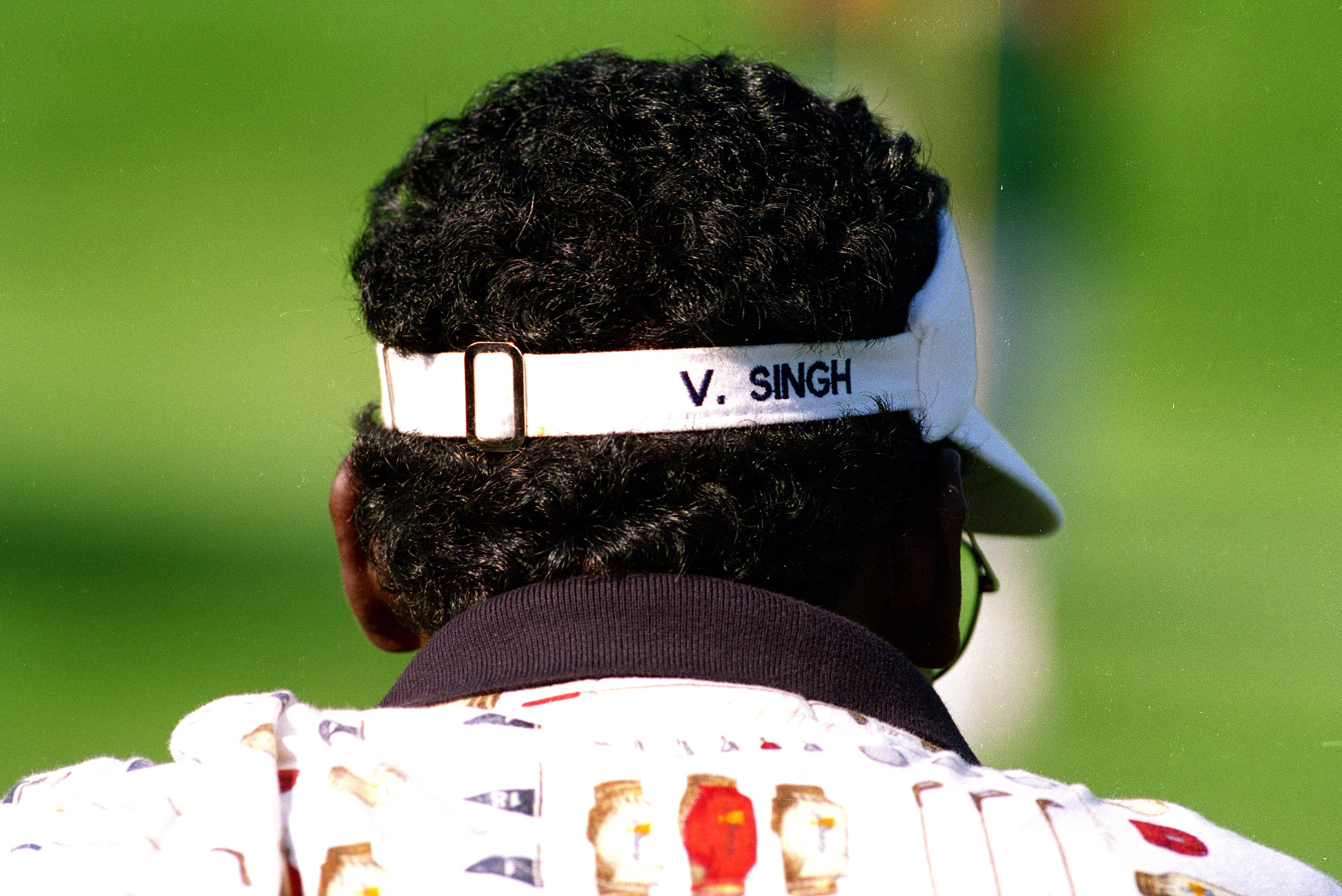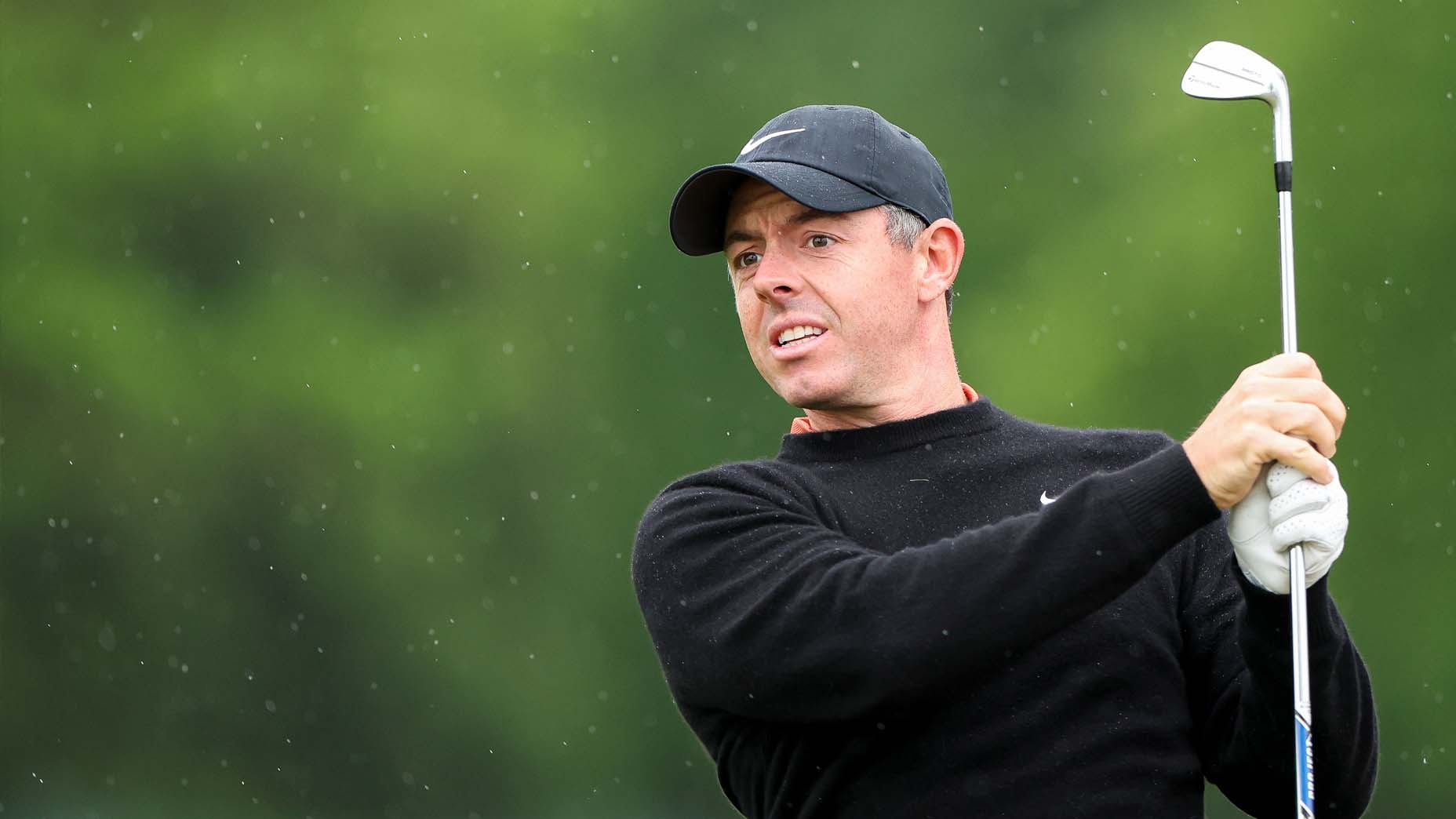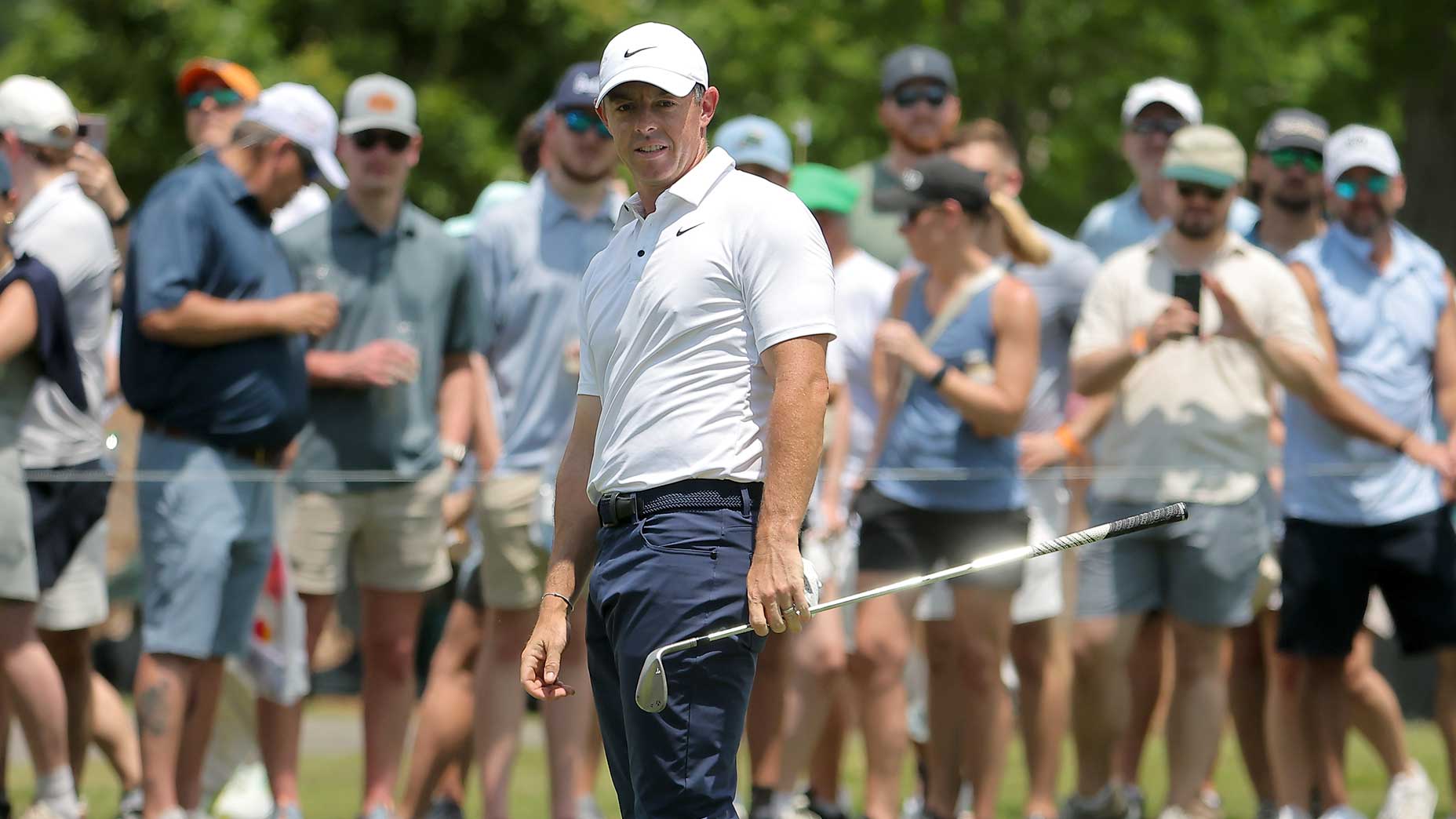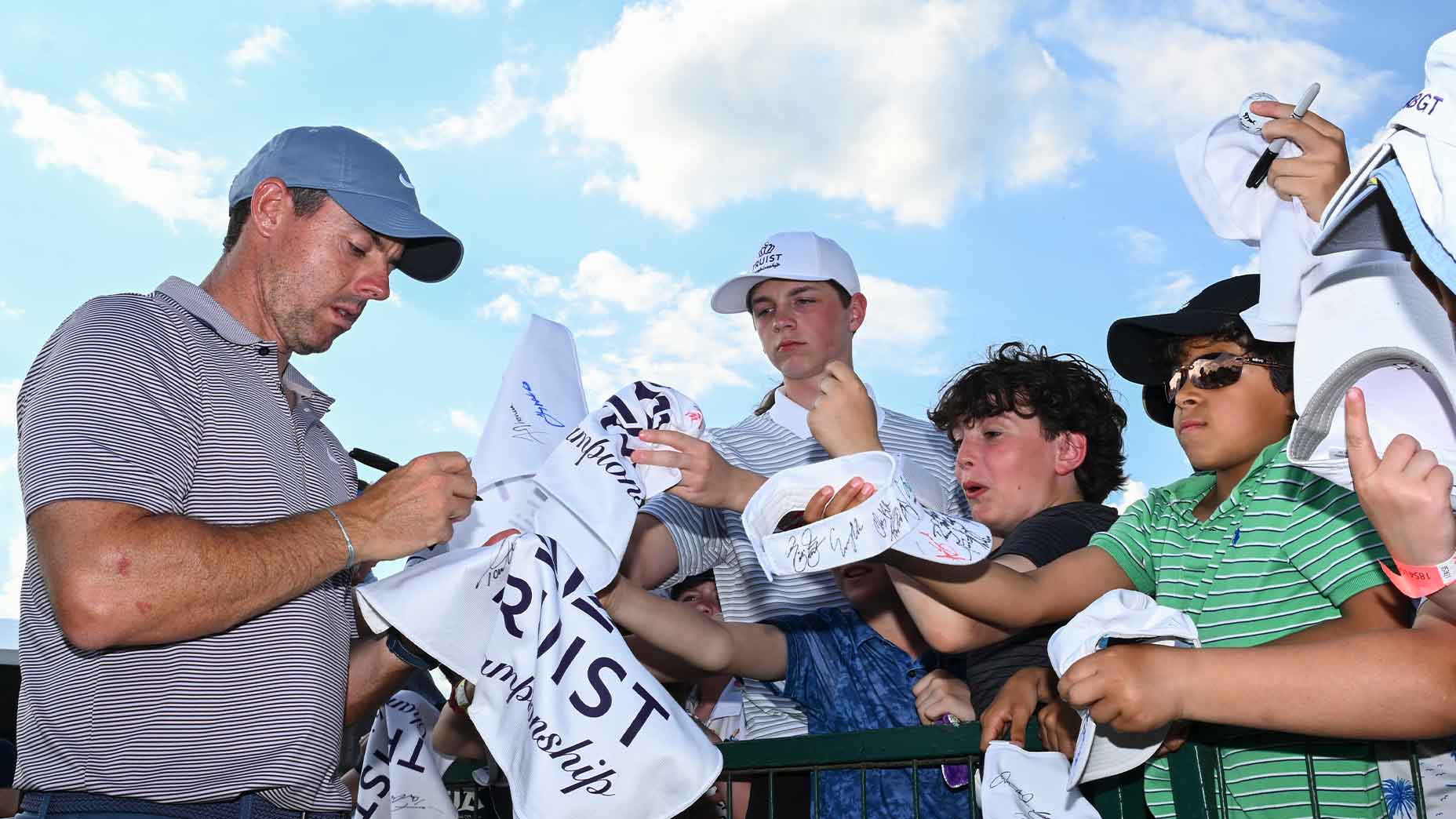This article originally appeared in the August 19, 1996 issue of Sports Illustrated and is reprinted here as part of a new monthly series for Golf+ called “Golf’s Greatest” exploring golf’s best stories, events and personalities through the eyes of writers who were there to see it for themselves. In the first installment, John Garrity joins Pete Madden to talk about his trip to Fiji and the investigation that led to this fascinating profile. Listen here:
They must be dancing in the streets in Fiji. — TV voice at last week’s PGA Championship, where Fiji’s Vijay Singh came within an eyelash of becoming the first player of color to win a major championship.
It’s June 1996, and no one is dancing. In fact, the prime minister of Fiji looks exasperated. Like many in his Polynesian island republic, Sitiveni Rabuka appears torn between admiration for Singh — “Fiji’s only sports millionaire” — and peeve that the expatriate golfer seems not to care what anybody in his homeland thinks. “Don’t pay too much attention to the negative feelings we have,” says the prime minister, looking fresh after 18 holes at Fiji’s Denarau Island resort. “I know Vijay personally; that’s why I can’t say more nice things about him.”
Anyone looking for a hint of irony in the eyes of Fiji’s strongman will be disappointed. But Rabuka (pronounced ram-BOO-ka) — described in that morning’s Fiji Sunday Post as ”the world’s most dashing coup leader” — is a golfer himself, an almost daily visitor to the Fiji Golf Club in Suva, the capital. He is also honorary president of the Fiji Professional Golfers Association. So while he might bristle when he hears that Singh has set foot in Fiji only twice in 16 years and fume when he reads that Singh thinks Fiji is no place to raise his six-year-old son, he must consider also that the tall, handsome Singh hits a two-iron about as well as anybody on earth.
That’s why Rabuka recently sent Singh a Fijian diplomatic passport — an honorary device allowing one to sweep through immigration channels and past border guards. Rabuka wonders, however, if he will get even a thank-you note from Singh, who now splits his time between homes in Ponte Vedra Beach, Fla., and London.
“He’s flying the Fiji flag out of convenience, I think,” says Rabuka, who seized power in a 1987 putsch and quickly raised himself from the rank of lieutenant colonel to brigadier general. “He’s not very keen on coming back. He said Fiji was a nice place to visit, but he didn’t want to live here.”
The prime minister, barely sweating after shooting 76 on the two-year-old Denarau course, breathes deeply of the trade winds cooling the open-walled club bar. He stares out at the palm-lined fairways and green mountain backdrop as if intent on discerning what would keep a true Fijian away. Specifically, he wonders why Singh’s last visit, in February, was only a whirlwind stop for a farcical skins game organized by Vijay’s older brother, Krishna. “I wish Vijay could come back and live here,” Rabuka says, “so our people could see and learn from a man who approaches his sport with such professionalism.”
That seems unlikely. Opportunities for professional golfers are few in the Republic of Fiji, which has a population of 750,000 and only 11 courses, most of them scruffy, nine-hole tracks. But surely, an overseas visitor ventures, the prime minister is heartened by Singh’s recent promise to fund a junior golf program in Fiji, a national system to identify and train the Vijay Singhs of the future. Rabuka snorts. “I’ll believe it when I see it,” he says. “I don’t think he’s sincere.”
[pagebreak]

Let’s go back to May of this year. Vijay Singh, 33 and prosperous, is having an iced tea in the grill room of the Tournament Players Club in Ponte Vedra Beach. He would rather be out under the high sun hitting balls on the practice range — this is not surmise, he says so — but he has agreed to an interview. This is an act of extreme sacrifice for Singh, who is known for curt replies, or no replies, when reporters approach him at a tournament. But here he is, pleasant and well mannered. Then the interviewer asks about Fiji, and Singh’s shoulders pull back reflexively.
“I’ve been asked a hundred times how I started golf,” he says, obviously reluctant to rehash what is, in fact, a pretty good tale. Is it because he anticipates the questions that must inevitably be asked? About Jakarta, 1985? The cheating allegation and his subsequent suspension from the Asian tour? His two years in exile as a club pro in the rain forests of Borneo? The Australian debts he took years to repay?
Singh couches his defensiveness in cliches. He says, “I like my clubs to do the talking.” Well, of course. Singh is comfortable with what his clubs say about him. They say he has won tournaments in Australia, Asia, Africa, Europe and North America. They say that he has won three tournaments on the U.S. Tour in three years, that he was PGA Tour Rookie of the Year in 1993 and that he has climbed as high as 12th in the Sony World Ranking and is currently 17th. His tie for fifth in last week’s PGA was not his first close call in a major. He finished in a tie for sixth in the 1995 British Open and was 11th at Royal Lytham and St. Annes this year. He was fourth in the 1993 PGA and tied for seventh in this year’s U.S. Open.
“I don’t like to talk about my private life,” he says. “The media” — and here the exasperation shows on his face, the same look the prime minister displays when talking about Singh — “the media knows everything about a player.”
If only it were so. Actually, Singh is golf’s international man of mystery, a ball-bashing cipher with no deep friendships and an emotional life known only to his wife, Ardena, and son, Qass. Reporters, far from being intrusive, have written off the Fijian as bad copy — a boring man, a loner. Most profiles of Singh make no mention of his suspension by the Asian tour when he was 22. Those writers who do cite the cheating allegation usually print without challenge Singh’s assertion that he did not, in fact, alter his scorecard to make the cut in the 1985 Indonesian Open but simply took the fall for “the son of an Indonesian VIP” who he says made the change.
Hardly anyone inquires as to why Singh has never represented Fiji in the annual World Cup of Golf. Asked why he hasn’t played for his home islands, Singh points to “some jealousy” among the selectors and says he was very hurt in 1993 when the Fiji PGA shunned him and chose two club pros who could barely break 80 at Lake Nona in Orlando. “It’s hard to explain,” he says. “Fiji is a poor country. There’s a lot of envy.”
Rabuka, on the other hand, insists Singh has never been available. According to the prime minister, all three golfing Singh brothers — Vijay, Krishna (who plays the Asian tour) and Mira (who this year opened a golf shop in Nadi, near the Singhs’ hometown of Lautoka) — declined invitations to represent Fiji in the 1995 World Cup in China.
To comprehend this apparent estrangement between golfer and archipelago, one must know more about Singh and more about Fiji. The most relevant fact is that Singh is not an indigenousn Fijian, but a Fijian of Indian extraction, a descendant of the Hindus and Muslims from the subcontinent who came to work Fiji’s cane fields between 1879 and 1916. Vijay’s father, Mohan Singh, was a refueler at the Nadi (pronounced NAN-di) International Airport, a busy passenger and cargo hub on the west coast of Viti Levu, Fiji’s largest and most populous island. Mohan Singh was also an accomplished golfer, a nine-time club champion at the seaside Nadi Airport Golf Club.
[pagebreak]

The story that Vijay has tired of telling — the Singh legend — has him learning the game from his father on the scenic, rain-tree-dominated hills of the 18-hole airport course. The young Vijay jumped the airport fence after school and raced across the huge runway to the course, where he practiced and played for hours, usually alone. From the shade of a large mango tree by the 14th fairway he hit hundreds of balls a day, stopping only to grab a mango off a branch or drink from a nearby tap. At low tide he hit balls on the flat, firm sand of the beach, a good place to learn the crisp contact needed to spin the ball off Fiji’s water-grass fairways. At home the young Singh studied photographs of Sam Snead and Tom Weiskopf. “My brothers would go to the hotels and bars,” Singh recalls. “I would never do that, even when I was 15 or 16. Golf was what I did.”
By the time he was 16, Singh was hitting his driver prodigious distances and winning island competitions. At 17 he was the Airport Club champion, Fiji amateur champion and owner of practically every other cup and medal the islands had to offer. “Vijay was cocky as all hell,” says Michael Lenz, the secretary-treasurer of the Fiji Golf Association, who ran events in the late ’70s in which Singh competed. “He used to sell the prizes before he even played the tournament. He was that sure of winning.”
Tony Cooper, a former secretary-treasurer of the FGA who directs public relations for the Westpac Bank in Suva, remembers Vijay fondly — but with no illusions. “He was a bit of a villain in those days,” Cooper says with a chuckle. “He was raw, never been out of Fiji.”
Never, that is, until Cooper took the 17-year-old Singh and three other players to Pinehurst, N.C., for the 1980 World Amateur Team Championship. Vijay shot 84-80-80-81, and the Fijians did not fare especially well, finishing 123 strokes behind a U.S. team led by Hal Sutton, Bob Tway, Jim Holtgrieve and Jay Sigel. But the Fijians did beat Papua New Guinea for the first time, allowing them to claim the championship of the South Pacific. That had Cooper on cloud nine — until he got a bill from Pinehurst that showed Singh with $700 in charges for phone calls to Fiji. “There was no malice in it,” Cooper hastens to say. ” Vijay was a very young fellow, totally naive, always well mannered. But I had to break the news to his father, and his father had to pay the bill to get me off the hook.”
The lesson that Singh took away from Pinehurst, however, was not one of fiscal responsibility. His poor play, measured against that of the Americans, convinced him that he needed stiffer competition than Fiji could offer. So he set out in 1982 to play professional golf in Australia: not the big tournaments but the mini-tour events and pro-ams in dusty outback towns like Kalgoorlie and Alice Springs. By his own account Singh was not ready when he hit Australia. That may explain why, to get by, he put the touch on various golf officials and stuck numerous pro shops with big phone bills. Cooper, visiting in New Zealand a couple of years later, met an officer of the Australian Golf Union whose eyes flashed when he heard the name Vijay Singh. “Well, every place he stayed he ran up these enormous bloody bills,” the official fumed.
“Vijay was banned from playing the PGA tour in Australia,” confirms Ray Graham, administrator of the South Pacific PGA. “He owed me money, and a lot of others, too. He was told he couldn’t play here again until those debts were settled.” It wasn’t so much the money, says Graham, but the seeming lack of gratitude. “He didn’t endear himself to people. Vijay wasn’t a boy who sent you a card or anything afterward.” Graham says that he and the others were finally repaid by Singh about four years ago.
Having been “given the flick” by Australia, Singh — now traveling with his wife-to-be, Ardena — moved on to the Asian tour. There, at 21, he won his first professional tournament, the 1984 Malaysian PGA Championship. But his progress was halted in the second round of the 1985 Indonesian Open in Jakarta, where he was in a threesome with Canadian pro Jim Rutledge and Ruswin Ali, an Indonesian amateur who was keeping Singh’s score. The tournament director of the Indonesian Golf Association, Rudy Lisapaly, ruled that Singh improved his score by one stroke before signing his card and was therefore disqualified. Edmund Yong, the secretary general of what was then called the Southeast Asia Golf Federation, notified Singh that he was indefinitely suspended from the Asian tour.
In recent years Singh has described the incident as a ”misunderstanding” and blamed Indonesian golf officials for punishing him unfairly. Ardena, who is far more outgoing and spontaneous than her husband, takes the same line, saying that Vijay repeatedly wrote letters to Yong pleading his innocence but got no indication when the suspension might be lifted. “Now that Vijay’s somebody,” Ardena says with a hint of a smile, “Mr. Yong comes up and says, ‘Hello, how are you?'” She adds, “We are extremely courteous but very cold.”
Yong suffered a serious illness and cannot comment, but an American pro who played the Asian tour at the time contradicts Singh’s account. “I was there,” says the player, who asked not to be identified. “It was not a misunderstanding. Vijay was accused and suspended for altering his own card. All of us who were around are very upset that Vijay denies this.”
Graham says he always accepted the charge at face value, and not just because of his own experience with Singh. “That’s quite typical on that tour,” he says. “Players can’t count.” In Nadi, Brian Eastgate, the course superintendent at Denarau, describes the Asian golf culture as more tolerant of rules-stretching — like that of American baseball, for instance, where spitballs and corked bats are winked at. Says Eastgate, ”Putting something over on your opponent is almost more important than the golf.”
[pagebreak]

In any event, the suspension from the Asian tour stopped Singh in his tracks. Casting about for a way to survive, he took a series of club-pro jobs in Borneo — the tournament player’s equivalent of Devil’s Island. Curiously, when Vijay and Ardena talk of this period of exile, they describe it as the happiest time of their lives. At Keningau, where Vijay gave lessons to lumberjacks and to truck drivers from a Shell Oil drilling operation, civilization and its discontents were 2 1/2 hours away on a dirt road. “You’d get up in the morning and hear the birds, the sounds of the jungle,” Vijay recalls. “Nothing to worry about. You had a roof over your head and something to eat. And we had each other. I learned a lot about life.”
At 500 Malaysian dollars a month — roughly $150 to $200 U.S. — Borneo could have been a sentence of life. But Singh took advantage of the steamy hours between nine and three, when only mad dogs and Englishmen wanted lessons, to refine his game. To maintain his competitive edge, he played high-stakes handicap matches with timber tycoons and Shell executives, games that prepared him for the pressures of major championships.
On one occasion Singh played the last hole with $10 in his pocket and $700 on the line. “It was a par-5 where you had to hit over water to an island fairway,” he recalls. “Everything was riding on it, and I hit my drive OB. And the feeling I had when I stood over the next drive was the worst feeling I’ve ever had in the game. How would I pay if I lost? Would I lose my job? What would I tell my wife?” Despite the pressure, Singh found the fairway with his second ball and made eagle — a par, with the penalty — while his opponent dunked one in the water and made 7. ”So I won the hole and a lot of money. Now, whenever I’m in contention in a tournament, I think about that.” With a guilty smile, he adds, “I never told my wife, either.”
The story of how Singh escaped from paradise is somewhat less dramatic but illustrative of his determination. Hoping to qualify for the 1987 British Open, Singh arrived early and played Luffness, his qualifying course in Scotland, every day for a month. When that didn’t work out — he shot 75-70 and missed qualifying by eight strokes — he quit his job in Borneo and joined Africa’s Safari tour, playing tournaments in smoky, chaotic outposts like Nigeria’s Benin City, which he describes as ”unbelievable, a Mad Max kind of place.” His victory in the 1988 Nigerian Open catapulted him to the top of the Safari tour money list, and by the end of the year he had won a Swedish tour event and tied for second at the European tour qualifying school. He won the Volvo Open in 1989, his rookie year in Europe, then four years later earned $657,831 in the U.S. while becoming the rookie of the year.
“It’s a great success story,” says Steve Cook, a former Asian tour player who now runs the South American tour. “I hear very nice things about Vijay today.” Graham describes the post-Borneo Singh as “a greatly transformed man” and gives credit to Ardena and the career shapers at International Management Group who signed Singh to a management contract in 1989. “He’s still a bit of a loner,” says Graham, “but you can’t blame him for that.”
Rabuka, who obviously has his differences with Singh, says he has “a lot of respect” for the golfer’s work ethic and praises him for boosting Fijian tourism. “Vijay’s a very easily misunderstood man because he’s so quiet and reserved,” the prime minister says. “People think he’s antisocial, and he’s not.”
Singh is not much concerned about the bridges he left burning in the Antipodes. The Australian debts were eventually paid, Graham says, but letters of remorse were never written. In Southeast Asia, meanwhile, resentment flares every time Singh casts himself as the victim in the Jakarta episode. “I think he’s been very stupid about that,” says Cooper, his old World Amateur Team coach. “Wouldn’t it be nice if Vijay just dropped a line and said, ‘I’ve done some silly things, and I’d like to make it good’? To my knowledge, he’s never cleaned the slate. He’s always had a chip on his shoulder about it.”
There is, of course, a larger context. The former British Commonwealth country that Singh left when he was 19 no longer exists, thanks to Rabuka and his armed cabal. Since 1990 the Fijian parliament has been gerrymandered along racial lines, with ethnic Fijians guaranteed a majority. Fijians of Indian extraction cannot hold the offices of president (a figurehead post) or prime minister (a Rabuka sinecure). What’s more, although Hinduism and Islam are accepted, the official religion is Christianity, with Sunday laws enforced for everyone except tourists. Predictably, some 40,000 professional and middle-class Indians have voted with their passports since the coup. Singh’s mother, three brothers and one of his sisters now live in Australia. His father resides in New Zealand, and another sister lives in the U.K. Rabuka may be a congenial and approachable strongman, but he hews to a Fiji for Fijians course.
[pagebreak]
Singh, from a distance, has made comments on Fiji’s progress — or lack of it — that can be taken as unpatriotic or merely provocative, depending on one’s point of view. His beef with the media, he says, derives in part from the way his views are distorted by the time they reach the South Pacific. “I told Golf Digest I would not bring my son up in Fiji,” he says, “because it’s a different environment, there’s no opportunity now. It came out, Vijay doesn’t have any use for Fiji.” He grimaces. ”You wonder if you should talk to the press anymore.”
Fair or not, the gossip washing up on Viti Levu’s beaches gives many Fijians the impression that Singh is a haughty millionaire. In June a fledgling Fijian golf magazine, Top Shot, reprinted a Jacksonville columnist’s blistering critique of the media-dodging Singh — “a man with all the personality and pizzazz of a chicken potpie” — and left even his supporters at the Nadi Airport Golf Club shaking their heads. “Vijay’s a naughty boy,” says family friend Paras Naidu. “He shouldn’t ignore the media. He’s not that good.”
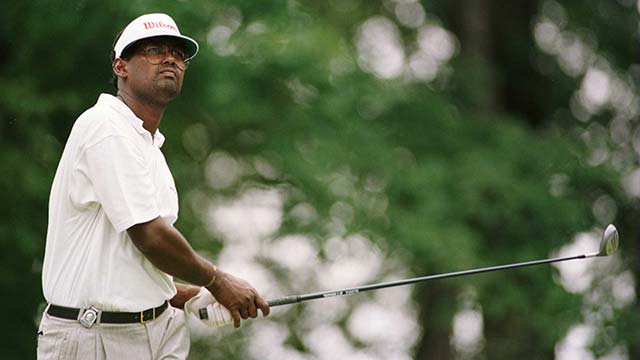
Every Singh misstep provides ammunition for those members of the Fiji PGA who don’t want him representing them in the World Cup. The prime minister insists that he, personally, wants Singh on the World Cup team, but others see racism and parochialism in the FPGA’s selections. “Three years ago it was sheer, pigheaded bigotry,” says the FGA’s Lenz. “The guy who was the head said, ‘We don’t want that Indian bastard representing us. We want Fijians.’ When Vijay got word of this, I think he said, ‘Why bother?'”
It’s clearly not just a case of Singh being difficult. The FGA put Singh’s name up twice for Fiji’s sportsman of the year, and each time the selection committee rejected his nomination, ostensibly because Singh was not a member of a local golf club. Two years ago Mohammed Aziz, president of the FGA and of Indian descent, offered to make Singh a lifetime member of the Nadi Airport Golf Club, but the sportsman of the year selectors still rejected the nomination.
And so the controversy devolves into farce. In June 1995, Krishna Singh announced that his brother would return to Fiji for just the second time in 16 years to play in a half-million-dollar skins game sanctioned by Rabuka and televised by Rupert Murdoch’s Star TV. By January the purse had shrunk to $100,000 and television was no longer mentioned. In February, two days before the match, the Fiji Times ran a front-page photo of Vijay with his mother — Vijay Singh back home — and reported that Vijay, Krishna, former PGA champion Wayne Grady and a local player would compete for $67,000.
By Friday — the day the prime minister hung a Commemorative 25th Independence Medal around Vijay’s neck at a $35-a-plate dinner — the purse had puckered to $50,000, and the local pros were grumbling that Krishna had made them pay an entrance fee to compete for the local pro slot and then asked them for an additional $10 to watch the skins game. (All but one of the unsuccessful pros boycotted Denarau on Saturday.) The actual prize money turned out to be a mere $27,000, $22,000 of which was won by Vijay.
To make matters worse, an incident on the 14th hole had spectators clucking. With $14,000 on the line, Krishna had a putt for birdie from the fringe — that is, until Grady saw him nudge the ball with his foot. Embarrassed, Grady pointed out the infraction, at which point Krishna snatched up his ball and stalked off to the next tee.
Four months later, as he cooled off in the Denarau lounge, the prime minister was still peeved. “I don’t believe a professional could have that kind of ‘accident,'” Rabuka said, his voice heavy with sarcasm. And surely it didn’t help that Krishna had reneged on his promise to pay the FPGA $1,500 and that he had skipped the country without paying his $3,000 phone and fax bill at the Sheraton Fiji Resort. From Rabuka’s hangdog expression, one got the idea that being a dictator is no picnic these days.
Expatriates tend not to be nostalgic. So those in Fiji who wonder why Singh seems to have forgotten them should consider that his best friend, when he was a boy, was a mango tree. Even now he can conjure up only two names when asked which Tour players know him well — Jim Thorpe and Jesper Parnevik.
It would be a stretch to say that Singh doesn’t care where he lives, but his sense of place is circumscribed by his practice needs: Paradise is a 350-yard-long range with a private tee at the far end, away from the chatterboxes and glad-handers. (“It’s mindless,” 1995 PGA champ Steve Elkington says of Singh’s practice sessions. “He just hits his driver all day.”) For solace and support Singh has only Ardena, and she admits she sometimes wonders “when he’s going to sow that wild oat. It isn’t possible for a man to be satisfied with just two things” — i.e., a wife and golf.
“Golf has been a gift to me,” Singh said at Ponte Vedra Beach, where the muggy summer afternoons must remind him of Nadi. ” Without golf, my loneliness would not have allowed me to succeed.” And Viti Levu, he acknowledged, provided the tranquillity that made his development possible. “It’s a beautiful island. It’s my home.”
But not really, not anymore. Not with his family gone and ethnic prejudice the law of the land. Fiji, as Singh sees it, is a palm-strewn hideaway where the clock runs 120 minutes to the hour and cows stand in the roads. “The water’s blue,” he says, ”and you spend a week there.”
Or less than a week, if you’re Vijay Singh — a man who seems to have become an island unto himself.
For more news that golfers everywhere are talking about, follow @golf_com on Twitter, like us on Facebook, and subscribe to our YouTube video channel.


